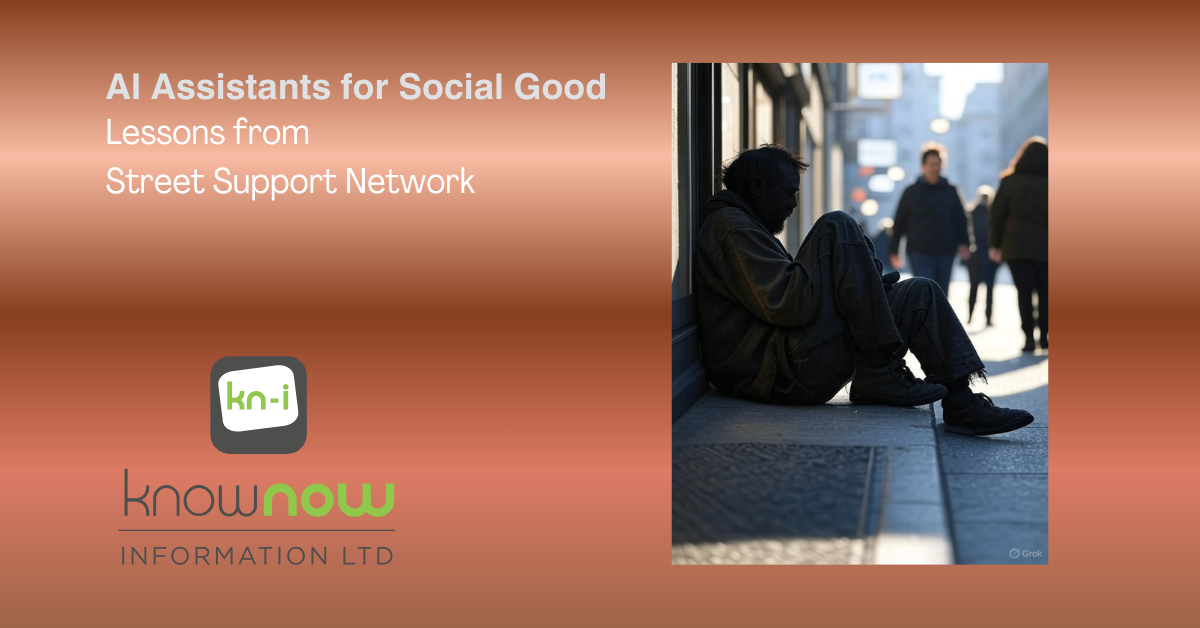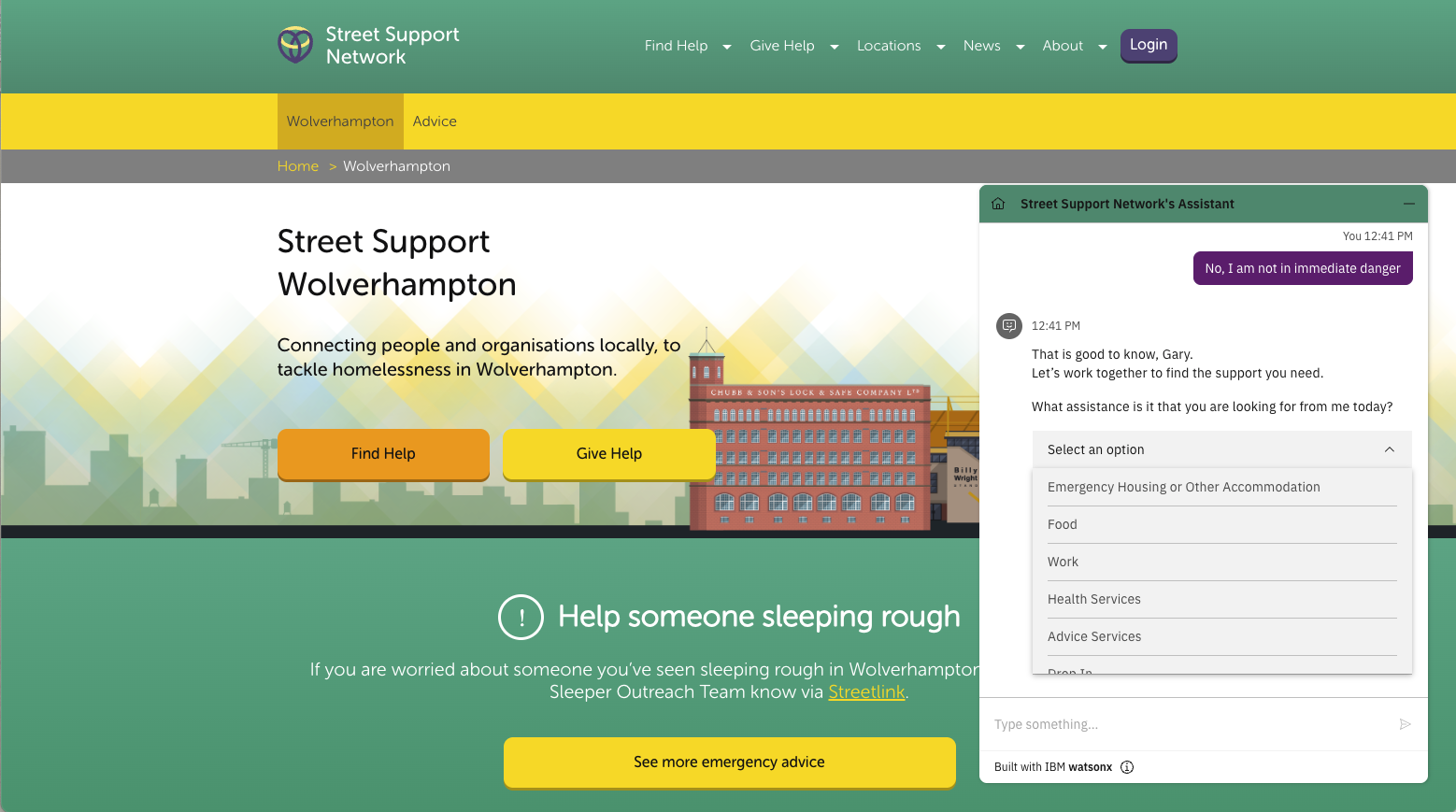In the evolving world of public service delivery, it’s not enough to simply signpost people to help. True transformation means revealing the gaps, illuminating the connections, and reimagining how people move through support systems. That’s the journey Street Support Network is on, and it’s why their work matters.
Their latest article, “Mirror mirror on the wall – Are we ready for what AI might show us at all? ” by Matthieu Lambert, reflects on how their new virtual assistant is doing more than helping people find support. It’s exposing friction points, policy blind spots, and structural gaps. Street Support built this assistant with Matthieu at the helm, and we at KnowNow were proud to support that journey, wiring up the data connections, enabling geolocation, and making sure the system could reach directly into their database of homelessness services.
Why watsonx assistant?
KnowNow was founded with a clear vision: to apply three converging technologies: cloud computing; microservices (then IBM Bluemix, now Cloud Foundry); and Watson/AI. We’ve used Watson Assistant since its earliest days, and today Watsonx Assistant remains our platform of choice.
It’s scalable, reliable, and enterprise-ready, with a visual logic that speeds up development without sacrificing control. Critically, it integrates effortlessly with APIs and adapts well to complex public sector use cases. For Street Support, that adaptability meant we could design resilient flows that always give the user a way forward, whether geolocation is available or not.
Architecture: Built to Flex, Fail Gracefully, and Connect
The assistant connects in real-time to Street Support Network’s service database via a secure API. If geolocation isn’t available, the system prompts for a postcode and falls back to a postcode lookup service, ensuring that users still receive accurate local results.
This resilient flow design means the assistant can always proceed. Users never get stuck, even when browser permissions or device limitations block precise location sharing. It’s not just smart, it’s considerate.
Custom Logic with a Human Lens
One of the most important design decisions was how to support both people seeking help for themselves and those acting on behalf of others. That distinction changes the questions asked, the data needed, and the way results are interpreted.
Equally, we ensured that sensitive personal attributes, such as gender or age, are only requested when absolutely necessary. For example, some emergency housing options are women-only. In those cases, asking the user’s sex becomes critical to return relevant results. But we don’t process, or even ask for data we don’t need.
SPEL: Where Human Expertise Still Matters
One area where our team added specific value was in introducing Spring Expression Language (SPEL) for condition-based logic. Generative AI could not reliably handle the nuance here, so we learned SPEL directly and built expressions that were accurate, transparent, and testable.
It wasn’t without its challenges, but it really mattered. We needed SPEL to process the results so that an appropriate number of local service providers were referred to the end-user. Getting this right took time but also helped us to develop a useful new skill for future developments.
Co-Production in Action
This was never just a technical build. From the beginning, Street Support Network and KnowNow worked in genuine partnership. Frequent update calls meant ideas could be tested, refined, and reworked together. Matthieu brought deep insight into the needs of homeless people and the complexities of service provision, while we brought architectural experience and technical delivery.
Holding Up a Mirror to the System
Some of the most impactful moments came not from us, but from the assistant itself. In early testing in Wolverhampton, no emergency accommodation options appeared. The problem wasn’t the technology, it was the system: services were referral-only, with unclear pathways or not listed at all.
Here the assistant revealed something important. It didn’t just provide an answer. It exposed a weakness. And that’s a gift for local planners.
The Strategic Shift: From Directory to Infrastructure
Already, the tool is evolving from a directory to a system insight engine. We’ve helped design it so that referral outcomes can be captured (once live), enabling future data on successful connections, unmet needs, and drop-off points. That data will feed into planning, funding bids, and service improvement.
Looking ahead, Street Support plans to scale this across its 25–30 partner cities, and also including Scotland. The vision is of a single intelligent “front door” for people in need, which works locally but also creates a coherent national picture.

Photo by ev on unsplash
The Bigger Picture
We see an even broader opportunity here. Imagine not just a homelessness support assistant, but a family of intelligent assistants across different service areas: housing; health; social care; employment. All designed with the same principles of co-production, resilience, and data-driven insight.
Brought together, these service-specific assistants could form something much bigger – a shared digital infrastructure for public services. One that respects local differences but delivers coherence, efficiency, and above all, humanity.
Shared Standards, Shared Success
Perhaps most importantly, this assistant is fostering alignment across cities and combined authorities. By implementing a common, intelligent front door for support access, Street Support Network is enabling a unified experience that supports both individuals and systems leaders.
That’s why we believe intelligent assistants are no longer just customer service tools. When implemented with purpose and care, they become infrastructure.
If you’re a local authority, a systems leader, or a strategist wondering how intelligent assistants could support your goals, get in touch. We’d love to help you build something that reflects your values, reveals your strengths, and supports the people who rely on your services. Get in touch here


0 Comments